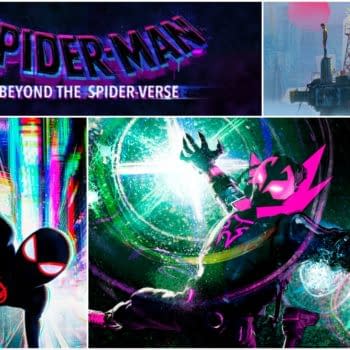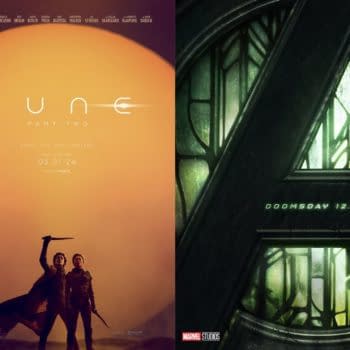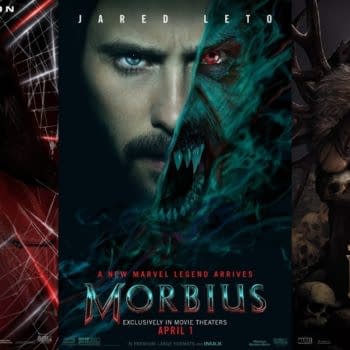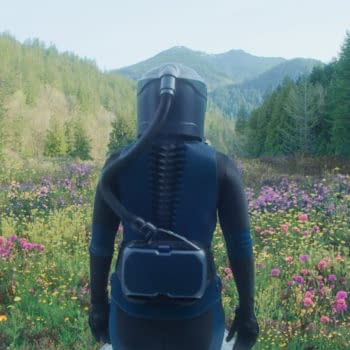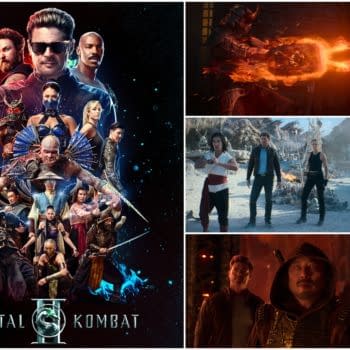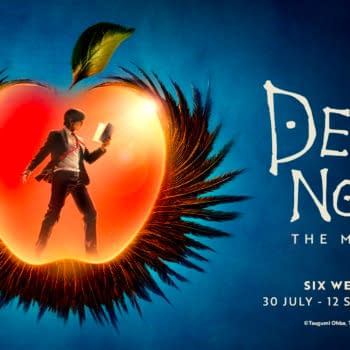Posted in: Conventions, Events, Pop Culture | Tagged: conventions, dc fandome, disney investor day, new york comic con, NYCC, san diego comic con, sdcc
A Post-Mortem on Virtual Conventions and Events: Part 2
The ongoing COVID-19 pandemic has impacted us all in many different ways, but pop culture conventions needed to find a way to adapt and adapt quickly once it became apparent that the virus wasn't going to go away in the summer. And so the virtual convention was born. In the first part of this essay, we looked at all of the virtual conventions and events from 2020. We looked at the winners, the losers, what worked, and what didn't. Now it's time to look at these events and compare them to the big, in-person events that they were replacing.
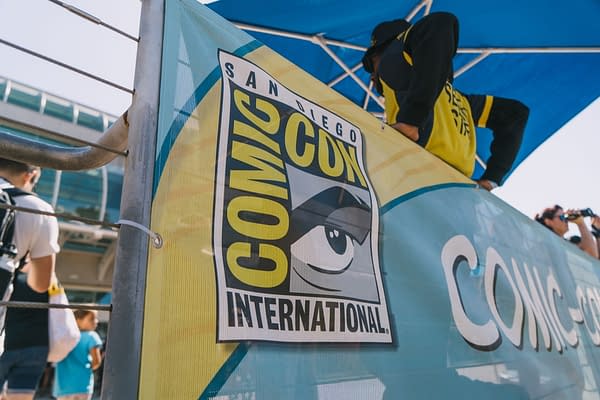
Are Conventions In General Still Worth It?
This is a conversation the gaming industry has been having for many years. While Nintendo does still show up to E3, they no longer do a big presentation at the event and instead host several online presentations called Nintendo Direct. As Comic-Cons get bigger and bigger, they are also more and more expensive for both exhibitors and fans. Disney already has two of their own conventions with the D23 Expo and Star Wars Celebration. Do they need Hall H at San Diego Comic-Con anymore? Warner Bros. put on one hell of a show with DC FanDome [the first time]. Do they need Hall H or Ballroom 20? There were rumors within days that WarnerMedia was looking to do different versions of FanDome focused on different aspects of their company, and that isn't that surprising. Mailing talent a grey background and creating a green screen virtual dome is a lot cheaper than paying for a massive booth in the San Diego Convention Center.
The concept of the big pop culture convention has been fundamentally broken since it became common practice to sleep outside to get into panels or to buy exclusive merchandise. I speak of this as someone who has slept out for Hall H, D23, and Star Wars Celebration panels. It's ridiculous, and the fact that we have normalized this is just mindblowing. Perhaps the COVID era will allow us to reevaluate how we run these conventions in the aftermath. No one should be sleeping outside to see the cast of a Marvel movie, and in a post-COVID world, how could anyone justify that sort of risk?
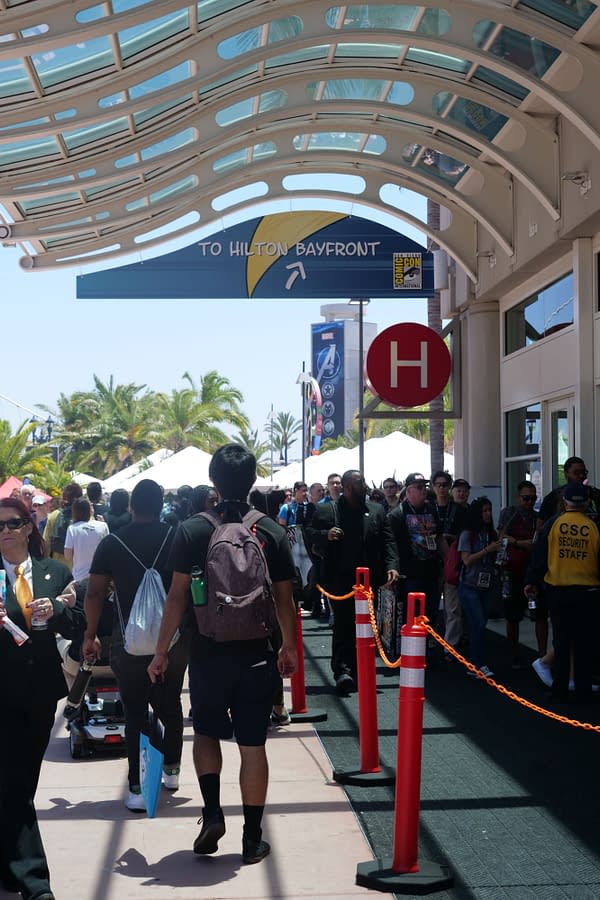
The risk of being in massive conventions with 200,000+ people is a nightmare to think about even now. Before it was canceled, I read a comment from someone saying Star Wars Celebration could totally happen if we all wore masks and social distanced on the sales floor. The only reason places like Disney World are getting away with it is putting caps on attendance, and also being (mostly) outdoors. But this becomes a different proposition in the mostly-enclosed spaces of a major convention. And so much of the convention experience revolves around standing in line, getting into exclusive events, and meeting people face to face, that social distancing becomes a far more difficult matter in execution. Attendance restrictions would have to be dramatic to make a difference. It's impossible to get SDCC tickets now; imagine if they cut the number of tickets they sell by 75%. It might not fix the social distancing problem, and it'll create many other problems as a side effect. For example, the flipping of exclusive merch will get much, much worse before it gets better.
And even a vaccine won't stop conventions from being cesspits. There is a reason why "con crud" is a thing that anyone who attends these conventions knows all too well. Most of us who attend these cons spend anywhere from a few days to a few weeks fighting off some sort of hell virus every time we attend. A vaccine for COVID isn't going to prevent con crud or any other virus that we might catch. This pandemic has made us all hypochondriacs, and that frame of thinking isn't going away anytime soon.
Missing the Human Element
The major perks of in-person conventions compared to virtual events is in just seeing other people. For remote workers like the writers at Bleeding Cool, San Diego or New York Comic Con might be the only times we see each other all year. For attendees, it gives you the opportunity to meet your idols in person or get that autograph or signing that you've always wanted. You make new friends and attend parties and enjoy life. We all miss being around people, and there just isn't anything like being in a room with 6,000 other fans having the time of your life. The energy of Hall H or the main rooms at D23 during the big panel is unlike anything you'll ever experience.
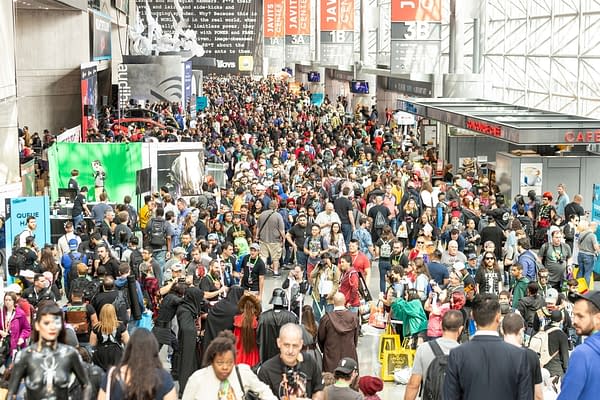
There is also the fact that for many, attending these conventions is a vacation. It's something that they look forward to for the entire year. It's not that different from going to a theme park for vacation; you're running around like a crazy person and not eating or sleeping enough, and you're exhausted beyond belief, and you wouldn't change a thing about it. If a convention stays virtual, those vacations and getaways for people cease to exist. If more events remain virtual, they could seem less special.
For journalists, the in-person element is important when it comes to establishing contacts within the industry. It's how you make friends and network. I work for Bleeding Cool because I was in the press room at New York Comic Con and happened to talk to the right person who introduced me to Rich Johnson and the rest is history. I wouldn't have the job I have now if New York Comic Con was virtual. Those roundtables also teach you how to speak to talent and sharpen your interview skills.
While it does create a weird social hierarchy having a small group of your biggest fans hyping your movie up sometimes years in advance from Hall H or other venues, that energy does help drum up interest from more casual viewers or readers. With a virtual convention, pretty much everyone can see the footage, and while that means more people hyping your stuff up, it just doesn't have the same impact. The fact you had to be there to see it is the thing that drives that hype, even if it forces people to sleep outside. Furthermore, studios have always been twitchy about sharing incomplete footage in places like Hall H because of the leaks; a virtual convention audience will only see polished and final products released.
So Where Do We Go From Here?
We asked this question back in August after FanDome, and the fact is we still don't really know. There are a lot of advantages to going virtual for your convention, but you also miss out on a lot of key factors as well. The company that's currently threading the needle the best is Nintendo. Conventions aren't going away, but they will be scaled down for the foreseeable future, and those big panels probably aren't going away either, but there will be less announced and less shown. We shouldn't expect to see conventions return anytime soon because even with the vaccine, it will take longer than the summer to roll it out to everyone. It isn't safe until most of the population is vaccinated.

As studios continue to consume and buy each other, the final media companies standing will be the ones with their own specialized events. At the moment, it's just Warner and Disney, but other companies could follow. Amazon Prime and what they did with Comic-Con @ Home was the sole highlight of that entire event. The next few years are going to be very interesting for media consumers and reporters. This pandemic has forced the movie industry to deal with the streaming question, and we're still seeing the fallout from that. A bunch of those announced Disney projects were supposed to be in theaters but are now going to Disney+.
For now, we should all continue to wear our masks, social distance, and get the vaccine as soon as possible so we can even think about bringing back big scale in-person conventions in 2022.






